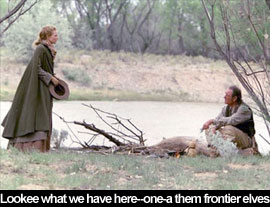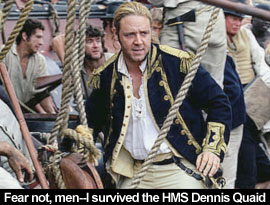Teknolust (2003); In July (2000); Taking Sides (2002); Monster (2003)
TEKNOLUST
**/****
starring Tilda Swinton, Jeremy Davies, James Urbaniak, Karen Black
written and directed by Lynn Hershman-Leeson
Im Juli.
***/****
starring Moritz Bleibtreu, Christiane Paul, Mehmet Kurtulus, Idil Üner
written and directed by Fatih Akin
TAKING SIDES
**/****
starring Harvey Keitel, Stellan Skarsgård, Moritz Bleibtreu, Birgit Minichmayr
screenplay by Ronald Harwood
directed by István Szabó
MONSTER
**½/****
starring Charlize Theron, Christina Ricci, Bruce Dern, Scott Wilson
written and directed by Patty Jenkins
by Walter Chaw As the year winds down and distributors great and small try to cram their films into rotation for possible awards consideration, the truism that there are just as many mediocre foreign and independent films as mainstream ones proves sage for a quartet of minor releases. Lynn Hershman-Leeson chimes in with Teknolust, another of her riffs on Derek Jarman, this one obsessed with Tilda Swinton and eternity through technology. Fatih Akin’s second film In July (Im Juli.) is essentially a German The Sure Thing with elements of After Hours, obsessed with eternity through an immortal beloved lit by the nimbus of various suns. One-time Oscar-winner István Szabó offers Taking Sides, a morality tale plucked half-formed from the stage, questioning the eternity of art against the requirements of morality. And Patty Jenkins weighs in with Monster, this year’s Boys Don’t Cry; it’s vérité as lower-class urban ugly, with Charlize Theron seeking eternity through a performance that breaks her out of her starlet mold, Halle Berry-style. Only time will tell if any of it keeps.

 by Walter Chaw
by Walter Chaw by Walter Chaw
by Walter Chaw